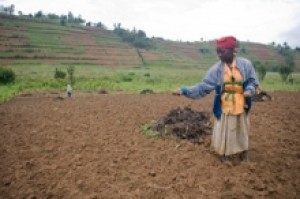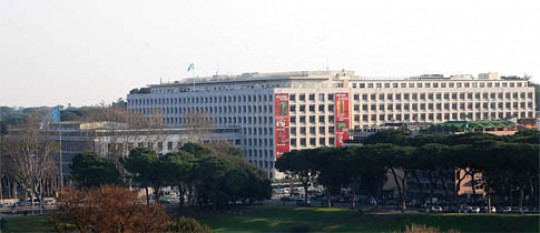Global Soil Partnership for Food Security launched at FAO. New effort to assure soils future generations.
Global Soil Partnership for Food Security launched at FAO
New effort to assure soils future generations
 Rome – FAO Director-General Jacques Diouf warned today that pressure on the world’s soil resources and land degradation are threatening global food security. He called for a renewed international effort to assure sufficient fertile and healthy soils today and for future generations.
Rome – FAO Director-General Jacques Diouf warned today that pressure on the world’s soil resources and land degradation are threatening global food security. He called for a renewed international effort to assure sufficient fertile and healthy soils today and for future generations.
Diouf was speaking here at the start of a three-day meeting to launch a new Global Soil Partnership for Food security and Climate Change Adaptation and Mitigation.
“Soil is an essential component of the world’s production systems and ecosystems,” Diouf said. “But it is also a fragile and non-renewable resource. It is very easily degraded and it is slow, difficult and expensive to regenerate,” he added.
Increased pressure
Soil resources across the globe are subject to increased pressure from competing land uses and are affected by extensive degradation processes that rapidly deplete the limited amounts of soils and water available for food production, Diouf noted.
According to FAO, in Africa alone 6.3 million hectares of degraded farmland have lost their fertility and water-holding capacity and need to be regenerated to meet the demand for food of a population set to more than double in the next 40 years.
In 1982 FAO adopted a World Soil Charter spelling out the basic principles and guidelines for sustainable soil management and soil protection to be followed by governments and international organizations.
Implementation lacking
“However, there have been long delays in applying the Charter in many countries and regions of the world. New efforts to implement it must be made as soon as possible,” Diouf said.
Besides helping implement the provisions of the World Soil Charter, the Global Soil Partnership is intended to raise awareness and motivate action by decision-makers on the importance of soils for food security and climate change adaptation and mitigation.
The partnership is also aimed at providing favourable policy environment and technical solutions for soil protection and management and at helping mobilize resources and expertise for joint activities and programmes.
The Global Soil Partnership will complement the 15-year-old Global Water Partnership initiated by the United Nations Development Programme and the World Bank in 1996 to coordinate the development and management of water, land, and related resources in order to maximise economic and social welfare without compromising the sustainability of vital environmental systems.
Greater resilience
Short-term interventions to provide food, water and basic needs such as seeds and fertilizer to kick-start agriculture is the usual response to food crises and extreme weather events such as in the Horn of Africa. However, longer-term and large-scale measures are needed in order to build greater resilience to degradation, drought and climate change and reduce human vulnerability to disasters.
The Horn of Africa crisis, with the ongoing famine in Somalia, is the most severe food security emergency in the world today. Besides issues of insecurity and governance, the crisis is caused to a large extent by inadequate soil and water management policies and practices.
The Rome meeting is expected to start work on an Action Plan on sustainable soil management that will develop synergies between partners and bring together work currently being done separately on soil survey, assessment and monitoring, soil productivity, soil carbon, soil biodiversity and ecology and soil and water conservation.
###
> UN Food and Agriculture Organization (FAO).
The Food and Agriculture Organization of the United Nations (FAO) is an intergovernmental organization and has 191 Member Nations, two associate members and one member organization, the European Union. Achieving food security for all is at the heart of FAO’s efforts – to make sure people have regular access to enough high-quality food to lead active, healthy lives.

FAO’s mandate is to raise levels of nutrition, improve agricultural productivity, better the lives of rural populations and contribute to the growth of the world economy.
The Food and Agriculture Organization of the United Nations (FAO) is working with its Members and the entire international community for achievement of the Millennium Development Goals.
These eight goals – each with specific targets and indicators – are based on the United Nations Millennium Declaration, signed by world leaders in September 2000. They commit the international community to combating poverty, hunger, disease, illiteracy, environmental degradation, and discrimination against women.
![]()
The eight Millennium Development Goals are:
Goal 1: Eradicate extreme poverty and hunger
Goal 2: Achieve universal primary education
Goal 3: Promote gender equality and empower women
Goal 4: Reduce child mortality
Goal 5: Improve maternal health
Goal 6: Combat HIV/AIDS, malaria and other diseases
Goal 7: Ensure environmental sustainability
Goal 8: Develop a Global Partnership for Development
* More information at UN Food and Agriculture Organization (FAO)
###
> United Nations (UN).
 The United Nations was established on 24 October 1945 by 51 countries committed to preserving peace through international cooperation and collective security. Today, nearly every nation in the world belongs to the UN: membership totals 192 countries.
The United Nations was established on 24 October 1945 by 51 countries committed to preserving peace through international cooperation and collective security. Today, nearly every nation in the world belongs to the UN: membership totals 192 countries.
When States become Members of the United Nations, they agree to accept the obligations of the UN Charter, an international treaty that sets out basic principles of international relations. According to the Charter, the UN has four purposes:
- to maintain international peace and security;
- to develop friendly relations among nations;
- to cooperate in solving international problems and in promoting respect for human rights;
- and to be a centre for harmonizing the actions of nations.
###
* The above story is adapted from materials provided by United Nations (UN)
** More information at United Nations (UN)





















